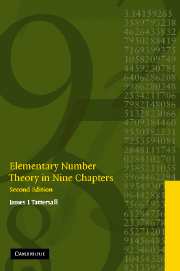3 - Prime numbers
Published online by Cambridge University Press: 06 July 2010
Summary
I was taught that the way of progress is neither swift nor easy.
Marie CurieEuclid on primes
In this section, we investigate the fundamental structure of the integers. Playing the role of indivisible quantities are those integers designated as being prime. A positive integer, other than unity, is said to be prime if its only positive divisors are unity and itself. That is, a prime number is an integer greater than 1 with the minimal number of positive integral divisors. A positive integer which is neither unity nor prime is called composite. By considering unity as being neither prime or composite, we follow the custom of the Pythagoreans, the first group to distinguish between primes and composites. Unfortunately, there is no efficient method to determine whether or not a given number is prime. Eratosthenes of Cyrene (now in Libya) devised a technique, referred to as the sieve of Eratosthenes, to find prime numbers. Eratosthenes was a Greek mathematician–astronomer who served as director of the Library at Alexandria under Ptolemy III and was the first to calculate accurately the size of the earth and the obliquity of the earth's axis. He was also an athlete, a poet, a philosopher and an historian. He was called Pentathlus by his friends for his success in five Olympic sports. His enemies called him Beta for they considered him to be second in most fields of learning and first in none. Eratosthenes called himself Philologus, one who loves learning.
- Type
- Chapter
- Information
- Elementary Number Theory in Nine Chapters , pp. 87 - 135Publisher: Cambridge University PressPrint publication year: 2005



